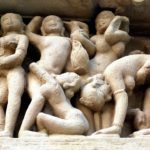Epicureanism Philosophy
Epicurus was one of the most popular and influential ethical philosophers in Ancient Greece. He taught that pleasure was the greatest goal in life, but that to attain it one had not to pursue greater and greater objects of desire, but rather to simplify one’s desires and expectations. By developing modesty and broadening one’s understanding of the world, people could find serenity and happiness. Rather than pursuing status and glory, Epicurus said that engaging in simple activities with friends was the best way to find contentment.
Epicureanism History
Not much is known about Epicurus, and few of his writings survive. But it is known that the school of philosophy he founded was one of the most popular of the Hellenistic period. Like Stoicism, it too was driven out of practice with the growth of Christianity.
Epicurus taught mostly in an academy he founded, called “The Garden,” which was noteworthy in its egalitarianism for the time — allowing women and slaves to participate in classes. Permissive attitudes such as these led some to inaccurately think it a place for drunkards and prostitution.
Today, like its contemporary, Stoicism, Epicureanism is now misrepresented by a modern word which doesn’t represent its original philosophy. In modern parlance, and “epicurean” is someone who only favors the finest, most expensive things in life. Of course, Epicurus actually taught something nearly opposite: That simple pleasures were best and that temperance and moderation were the keys to happiness.
Epicureanism Practice
Epicureanists’ highest goal was pleasure, but they divided pleasure into categories: Those of the mind, and those of the body. They further divided these two categories into Kinetic and Katastematic pleasure – the former the type of pleasure you get from action, such as eating (body) and discussing (mind) and the latter you get from the absence of desire or pain – such as satisfaction (body) and security (mind). Katastematic pleasure was the higher of the two goals and the best way to attain it was to train one’s mind to be free from desires and fears. The way to do this was to learn to differentiate between natural and necessary desires, and unnatural and unnecessary ones. By avoiding the latter, one could reach a state of aponia (freedom from physical pain) and ataraxia (freedom from mental pain).
Epicureanisms
Do not spoil what you have by desiring what you have not; remember that what you now have was once among the things you only hoped for.
— Epicurus
I too am an Epicurean. I consider the genuine (not the imputed) doctrines of Epicurus as containing everything rational in moral philosophy which Greece and Rome have left us.
— Thomas Jefferson
Nothing is enough for the man to whom enough is too little.
— Epicurus
Epicureanism Community
Get ordained as an Epicureanist Minister










